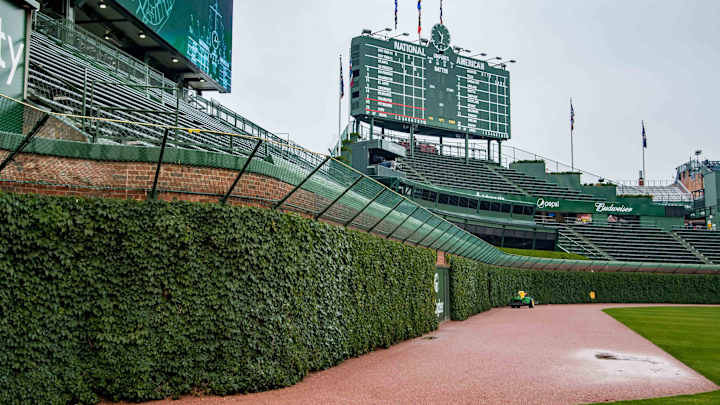Using Statistics to Evaluate: The Greatest First Baseman in Chicago Cubs History

There are the saddest of possible words: "Tinkers to Evers to Chance."
Baseball's Sad Lexicon is possibly the most famous sports poem in the history of American culture, that or Casey at the Bat.
To the turn of the century Chicago Cubs fans though, the lexicon is a reminder of the greatest run in their history, and Frank Chance was the Hall of Fame first baseman at the end of that famous double-play tandem.
He was the best fielding first baseman of his era, as well as a prolific base stealer with two World Series rings and four pennants to boot.
But even in his age, he probably would not have been considered the greatest first baseman in the Cubs young history. That title would have to go to Cap Anson, baseball's first hit king.
Anson was one of the game's first great superstars, debuting in the National Association at age 19, before joining the Cubs as a 24 year old in 1876.
In Chicago, he would stay for the next 22 years, building his legacy as an all-time great.
One of the first men inducted into the Hall of Fame in 1939, just years after the museum's opening, Anson was a career .331 hitter during an era when batting average was the key statistic.
His legacy carried on though, not as a baseball player, but for something far more heinous.
Anson was by far the most outspoken player on segregation. In the late 19th century, there were a scattering of black players in Major League Baseball, and although the decision to ban them was made by owners behind closed doors, Anson emphatically insisted on the ban.
As baseball's preeminent star and a team manager, his influence cannot be understated, going as far as to refuse to play against team that rostered black players, before the ban was made official.
That is all not to mention he frequently bet on baseball, while he was involved in the game — both as a player and a player-manager.
Though Anson was a fantastic ball player, he's not someone any organization would want on their team, nor wish to associate with.
Between Chance and Anson, the Cubs were primed for a legacy of great first basemen, but for much of the 20th century, it was a position in which they lacked star power.
Not until Mark Grace in 1988 did they again have a high-caliber player with longevity at first base. Though he never won anything with the Cubs, Grace was a prolific fielder for his entire career, taking home Gold Glove honors four times and hitting like an All-Star.
Though his Chicago peak never matched that of Anthony Rizzo, Grace had over 30% more plate appearances than Rizzo with the Cubs.
Rizzo though, eclipsed Grace in both fielding and hitting.
Where Grace lacked power, Rizzo hit 30 or more home runs in four consecutive seasons from, 2014-17. Grace was worth only 66 in Chicago in 16,525 innings, Rizzo was worth 73 DRS in just 11,316 innings.
Rizzo was a more efficient defender and a better hitter, he even won four Gold Gloves, just like Grace.
- Cap Anson | 1876 - 1897: .331/.396/.448, 142 OPS+, 97 HR, 277 SB, 57 DRS, 84.8 bWAR, 6.0 bWAR/162
- Frank Chance | 1898 - 1912: .297/.394/.394, 135 OPS+, 20 HR, 403 SB, 48 DRS, 45.9 bWAR, 5.9 bWAR/162
- Mark Grace | 1988 - 2000: .308/.386/.445, 122 OPS+, 148 HR, 70 SB, 66 DRS, 44.2 bWAR, 3.8 bWAR/162
- Anthony Rizzo | 2012 - 2021: .272/.372/.489, 130 OPS+, 242 HR, 62 SB, 73 DRS, 36.7 bWAR, 4.6 bWAR/162
Lined up together, it becomes clear that Rizzo and Grace are eclipsed by the two Hall of Fame Cubs first basemen of old.
While Chance's slashline may look mediocre in comparison to today's hitters, one must remember he played during the darkest years of the deadball era. A .789 OPS was far more valuable in that age, as evidenced by OPS+.
Rizzo's OPS as a Cub may be .861, but compared to the competition Chance faced, that sort of production is far less outstanding.
While Anson may seem the easy choice of the four, given his rWAR totals and OPS+, Chance is still hot on his heels in rate statistics. Because of his superior fielding and base stealing abilities, Chance is a more well rounded player.
Though Anson may have a slight edge in bWAR/162, it's negligible given the fickle era in which the two men played, and the fact that WAR wouldn't exist for another 100 years after both retired.
Given Anson's record as one of the most truly awful people to ever play the game of baseball, we'll bestow the honor of greatest Chicago Cubs first baseman to Frank Chance.
More From SI's Inside The Cubs
- Could Mike Trout Request a Trade to the Chicago Cubs?
- Did David Robertson Net the Cubs a Future Star in Ben Brown?
- Hoerner is the Cubs Shortstop of the Future
- Cubs Could Give Canario a Shot in September
- Could the Cubs Land Trea Turner in the Offseason?
- Chicago Cubs Have a New Top Prospect in Their Rankings
- Is This Top Cubs Prospect Destined for the Mound at Wrigley?
- Steele Offers Glimpse Into Future of Cubs Rotation
- Do the Chicago Cubs Have the National League's Best Bullpen?
- Can Christopher Morel be a Long-Term Solution in Center Field?
Make sure to follow Inside the Cubs on Twitter!
